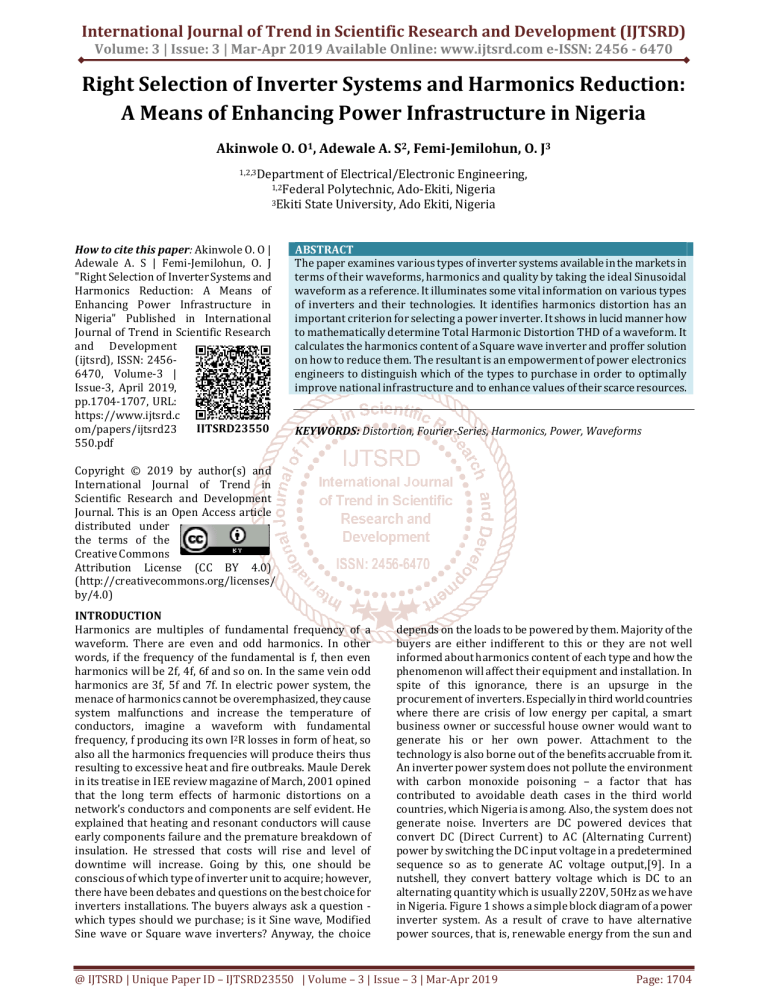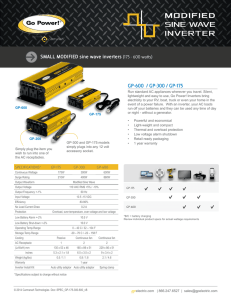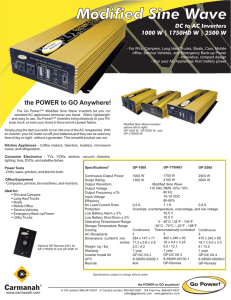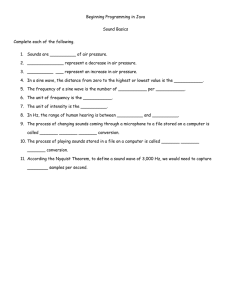
International Journal of Trend in Scientific Research and Development (IJTSRD)
Volume: 3 | Issue: 3 | Mar-Apr 2019 Available Online: www.ijtsrd.com e-ISSN: 2456 - 6470
Right Selection of Inverter Systems and Harmonics Reduction:
A Means of Enhancing Power Infrastructure in Nigeria
Akinwole O. O1, Adewale A. S2, Femi-Jemilohun, O. J3
1,2,3Department
of Electrical/Electronic Engineering,
Polytechnic, Ado-Ekiti, Nigeria
3Ekiti State University, Ado Ekiti, Nigeria
1,2Federal
How to cite this paper: Akinwole O. O |
Adewale A. S | Femi-Jemilohun, O. J
"Right Selection of Inverter Systems and
Harmonics Reduction: A Means of
Enhancing Power Infrastructure in
Nigeria" Published in International
Journal of Trend in Scientific Research
and Development
(ijtsrd), ISSN: 24566470, Volume-3 |
Issue-3, April 2019,
pp.1704-1707, URL:
https://www.ijtsrd.c
IJTSRD23550
om/papers/ijtsrd23
550.pdf
ABSTRACT
The paper examines various types of inverter systems available in the markets in
terms of their waveforms, harmonics and quality by taking the ideal Sinusoidal
waveform as a reference. It illuminates some vital information on various types
of inverters and their technologies. It identifies harmonics distortion has an
important criterion for selecting a power inverter. It shows in lucid manner how
to mathematically determine Total Harmonic Distortion THD of a waveform. It
calculates the harmonics content of a Square wave inverter and proffer solution
on how to reduce them. The resultant is an empowerment of power electronics
engineers to distinguish which of the types to purchase in order to optimally
improve national infrastructure and to enhance values of their scarce resources.
KEYWORDS: Distortion, Fourier-Series, Harmonics, Power, Waveforms
Copyright © 2019 by author(s) and
International Journal of Trend in
Scientific Research and Development
Journal. This is an Open Access article
distributed under
the terms of the
Creative Commons
Attribution License (CC BY 4.0)
(http://creativecommons.org/licenses/
by/4.0)
INTRODUCTION
Harmonics are multiples of fundamental frequency of a
waveform. There are even and odd harmonics. In other
words, if the frequency of the fundamental is f, then even
harmonics will be 2f, 4f, 6f and so on. In the same vein odd
harmonics are 3f, 5f and 7f. In electric power system, the
menace of harmonics cannot be overemphasized, they cause
system malfunctions and increase the temperature of
conductors, imagine a waveform with fundamental
frequency, f producing its own I2R losses in form of heat, so
also all the harmonics frequencies will produce theirs thus
resulting to excessive heat and fire outbreaks. Maule Derek
in its treatise in IEE review magazine of March, 2001 opined
that the long term effects of harmonic distortions on a
network’s conductors and components are self evident. He
explained that heating and resonant conductors will cause
early components failure and the premature breakdown of
insulation. He stressed that costs will rise and level of
downtime will increase. Going by this, one should be
conscious of which type of inverter unit to acquire; however,
there have been debates and questions on the best choice for
inverters installations. The buyers always ask a question which types should we purchase; is it Sine wave, Modified
Sine wave or Square wave inverters? Anyway, the choice
depends on the loads to be powered by them. Majority of the
buyers are either indifferent to this or they are not well
informed about harmonics content of each type and how the
phenomenon will affect their equipment and installation. In
spite of this ignorance, there is an upsurge in the
procurement of inverters. Especially in third world countries
where there are crisis of low energy per capital, a smart
business owner or successful house owner would want to
generate his or her own power. Attachment to the
technology is also borne out of the benefits accruable from it.
An inverter power system does not pollute the environment
with carbon monoxide poisoning – a factor that has
contributed to avoidable death cases in the third world
countries, which Nigeria is among. Also, the system does not
generate noise. Inverters are DC powered devices that
convert DC (Direct Current) to AC (Alternating Current)
power by switching the DC input voltage in a predetermined
sequence so as to generate AC voltage output,[9]. In a
nutshell, they convert battery voltage which is DC to an
alternating quantity which is usually 220V, 50Hz as we have
in Nigeria. Figure 1 shows a simple block diagram of a power
inverter system. As a result of crave to have alternative
power sources, that is, renewable energy from the sun and
@ IJTSRD | Unique Paper ID – IJTSRD23550 | Volume – 3 | Issue – 3 | Mar-Apr 2019
Page: 1704
International Journal of Trend in Scientific Research and Development (IJTSRD) @ www.ijtsrd.com eISSN: 2456-6470
wind, the desire to have static inverters to convert generated
Direct Current DC from these sources to Alternating
Figure 1: A Representation of a Simple Power Inverter
System.
Current AC quantity has increased tremendously, [2]. In
olden days, there were rotary inverters that comprise DC
motors that have AC generators connected to their shafts.
Due to the presence of moving parts, they deliver lower
efficiencies of about 60% and they have high idle power
consumption, [7]. They are also classified to electric quantity
at their sources, that is, Voltage Source Inverters (VSI) and
Current Source Inverters (CSI). Current source types are less
popular compared to Voltage Source types, [9].
Square Wave Inverters
They have square wave as their output waveforms. The
output waveforms rise straight up, level off for a time at peak
voltage and then drop straight down. It levels off for a time in
the negative direction as shown in figure 2. They were the
pioneer static inverters.
The Total Harmonic Distortion THD is about 45%, [2]. They
are not efficient, parade poor regulation and are not
conducive for some electronic devices, [3]. Electric motors
could be powered by them but with excessive heat
dissipation. [7].Other devices that may not work properly
are laser printers, photocopiers, digital clocks, sewing
machines with speed/microprocessor controls and other
systems incorporating microprocessors.
Figure 2: Square Wave.
Modified Sine Wave Inverters
A modified Sine wave inverter, also being referred to as
quasi-Sine wave resembles square wave type except that it
rests at zero for a short time, thus, has one additional step.
[7]. This is the most common inverter output in the market,
it has Total Harmonic Distortion THD of 23.8% which is
lesser than that of a square wave type of about half of that of
square wave, hence more electronics devices will work well
with these types. This type has an improved efficiency and
better regulation but its high number of harmonics still
affects sensitive equipment such as medical monitors. It can
also cause hum in a radio or sound system or snowy video
picture. [8].
Figure 3 : A Modified Sine Wave
Sine Wave Inverters
They are also referred to as True Sine Wave or Pure Sine
Wave Inverters. A Sine wave inverter waveform smoothly
increases to its peak and smoothly decreases. They are
Figure 4: A Sine Wave.
very costly and are not common in the markets. A sine wave
inverter has about 3% Total Harmonic Distortion (THD).
[2].These types are reliable, harmless, devoid of interference
and similar to the power obtainable from the power outlet.
[3]. They allow motors to run faster, quieter and cooler. [8].
Pure Sine Wave inverters can safely run more sensitive
devices like laser printers, laptop computers, power tools,
digital clocks and medical equipment [1].
Inverters Output Waveforms and Timing Circuits of
Devices
Timing circuits often work in accordance with zero crossing
point. They tend to work for a period where voltages cross
zero volts, at this point, they start their clocks. For example, a
drill works by pressing its trigger. The trigger allows the
electricity to pass depending on the time. A true Sine wave
product has a zero crossing slope thus enabling the timing
system to commence work. When a load is a simple type,
maybe a bulb or resistive element or an induction load,
Modified Sine wave performs optimally. But this is not the
case with sensitive electronics products – here, a Sine wave
inverter will perform better. Some digital clocks are
synchronised with ac source voltages, the squaring circuits
use the zero crossing points to generate square waves which
are afterwards divided by counters for timing purposes.
Waveforms Generation
In electrical engineering, waveforms generations by an
engineer can never be waved aside. Everything has to do
with either manipulation or synthesizing signals or
waveforms. The ideas of waveforms shaping for gating
circuitries always highlight the ingenuity of engineers. A
function is said to be periodic of its function value repeat it
regular intervals of the independent variable. The regular
interval between repetitions is the period of the oscillations,
[6].
@ IJTSRD | Unique Paper ID - IJTSRD23550 | Volume – 3 | Issue – 3 | Mar-Apr 2019
Page: 1705
International Journal of Trend in Scientific Research and Development (IJTSRD) @ www.ijtsrd.com eISSN: 2456-6470
Also,
(9)
f (t)
It repeats itself in magnitude but reverses in phase after
every half period. The same thing is applicable over a
quarter wave. In this case, an = bn =0 for even n, that is, all
even harmonics are absent.
Hence, f (t) = b1Sinωt + b3Sin3ωt + b5Sin5ωt + b7Sin7ωt (10)
Computing bn over a quarter wave:
bn =
dt
(11)
But f (t) = Ev dc
Figure 5: A Representation of a Sine Wave.
Fourier series indicates that a function is made up of sine
components. The fundamental frequency consists the largest
period and is also called first harmonics. To generate
waveforms similar to that of the electricity supply authority,
it has to be done in such a way that harmonics distortions
are reduced. In some applications, harmonics cause
degradation of equipment; hence it has to be de-rated. THD
is measured [2] thus
(1)
(12)
By substituting for f (t),
bn =
dt
bn =
bn =
ϴ=
bn =
=
(n = odd number)
The fundamental coefficient i.e. n=1
b1 =
In order to study harmonics, wave shapes understanding is
priceless. And this can be done by employing Fourier series
which is the tool for analysing wave shapes.
= f(x + π), that is, the waveform is periodic,[6].
(2)
also f(t) = a0 +
Sinωt +
Sin3ωt +
Sin5ωt +
Sin7ωt (13)
From the series, 3rd, 5th and 7th harmonics decreases with a
factor of
Fourier Series of A Square wave Inverter
If f(x) is defined on the interval –π x π and f(x)
f(x) = a0 +
f(t) =
, the nearest harmonics having biggest
magnitudes, that is, one-third the magnitude of the
fundamental, has its frequency equal to 150Hz, [9].
Fundamental frequency is 50Hz as we have in Nigeria. The
measure of distortion brought about by harmonics is
computed as Total Harmonic Distortion THD thus
(3)
it means that
f (t) = a0 + a1Cosωt + a2Cos2ωt+ a3Cos3ωt +... + b1Sinωt+
(4)
b2Sin2ωt+ b3Sin3ωt+...
Taking E = 1V
THD becomes
THD = 0.453 100% = 45% (Square Wave Inverter)
Using similar methods it can be shown that a Modified Sine
Wave and True Sine wave inverters have their THDs equal to
20% and 3% respectively.
Figure 6: A Representation of a Square Wave.
The square waveform is an odd function since
f (t) = - f (-t) or f (
a0 =
dt
bn =
(5)
(6)
an =
dt
, π = 3.142
(7)
dt
A waveform that exhibit odd symmetry, only Sine terms are
present, a0 =0. [6].
So equation 4 becomes
f(t) = b1Sinωt+ b2Sin2ωt+ b3Sin3ωt+...
(8)
Reduction of Harmonics
It has been established that harmonic distortion is the
deviation of the generated waveform of the inverter voltage
from the ideal sinusoidal waveform. Harmonics presence
does affect the load powered by the device hence they have
to be mitigated. This can be achieved by connecting
harmonics trap filters across the output terminals of the
inverter thereby filtering out the harmonics. An LC low pass
filter is normally connected to the output terminals of the
inverter to roll-off high frequency harmonics. The knowledge
of the harmonics frequencies enables tuning of the cut-off
frequency of the filter, [9]. The 3rd harmonic is the hardest to
filter out and is equal to
of the magnitude of the
fundamental, [2].
@ IJTSRD | Unique Paper ID - IJTSRD23550 | Volume – 3 | Issue – 3 | Mar-Apr 2019
Page: 1706
International Journal of Trend in Scientific Research and Development (IJTSRD) @ www.ijtsrd.com eISSN: 2456-6470
Specifications of Power Inverters
To procure or design and construct an inverter unit, a power
electronics engineer is expected to understand the devices to
be powered by them in relation to their peculiarities. One
should be interested in its protection features, he needs to
ask questions like: does it have overload and over
temperature shutdown mechanisms, low voltage alarm and
shut down protections, short circuit protection, high battery
voltage shut down and polarity or reverse connection
protection. According to Ningbo, Other desirable
specification of note are:
1. Maximum Continuous Power in Watts.
2. Peak Power in Watts.
3. AC output voltage.
4. AC output frequency.
5. AC output waveform.
6. DC input voltage.
7. DC Voltage Range.
8. No load current.
9. Efficiency
10. Charger current
11. Method of cooling
12. Dimensions and Weight.
CONCLUSION AND RECOMMENDATIONS
The paper has succeeded to shed lights on various inverter
types; they have been juxtaposed with their harmonic
contents. It shows that True Sine wave types have lesser
harmonic distortions hence parade superior circuitries with
attendant high cost; Square wave types are the cheapest
while Modified Sine wave ones are the most common types
with quality factor in between the former two. The method
for computation of THD for Square wave inverters can as
well be employed for others. Reduction of harmonic
distortions will undoubtedly mitigate the negatives
obtainable from them. All information provided are the types
that will aid the capacity of any buyer to choose the right
unit for a specific application. Nevertheless, students and
designers alike will find the contents provided useful for
their scholarly treatise.
Due to the high cost of a pure sine wave inverter, an engineer
can obtain an improved Modified Sine Wave Inverter. In
addition to the above, the following recommendations are
proffered:
1. Modified Sine Wave Inverter can be improved further by
adding another step in its waveform, [2].
2. The complexity of the driving stage can be reduced by
using MOSFET power stage.
3. The use of IGBT in power stage will bring about
excellent high voltage operation and high current
handling capacity. [7].
REFERENCES
[1] Doucet, J., Eggleton, D. and Shaw, J.(2007). DC/AC Pure
Sine Wave Inverter.Wocester Polytechnic Institue.
NECAMSID Sponsored. Pp 1-6
[2] Hann, J. H. (2006). Modified Sine Wave Inverter
Enhanced. Power Electronics Technology. Retrieved
online
December,
2013
from
www.powerelectronics.com.Pp 20-22
[3] Major Power .Com. Frequently Asked Questions About
Power Inverters. Retrieved December 2013 from
http://www. Majorpower.com.
[4]
Maule, D. (2001). Regulating Mains Pollution. IEE
Review, Vol.47, No 2. Pp. 35-38
[5]
Ningbo Star Solar. 1000W Model: SSSL1000W-12.
Manual
Retrieved
December,
2015.
www.pvsolarchina.com
[6] Stroud, K. A. and Booth, D.J.(2003). Advanced
Engineering Mathematics, 4th Edition. Palgrave
Macmillan, UK. Pp 172-230
[7] Trace Engineering. A Review of Inverter Design and
Topologies.
Accessed
December,
2013.
http://www.treceengineering.com. Pp 1-16
[8] Vijay, S. (2006). Advantages of Pure Sine Wave
Inverters over Modified Sine Wave Inverters. xcerpts
from G4 Inver charge Series Manual. Samlexamerica.
Retrieved October,
2013
from
www.samlexamerica.com. Pp 1-3
[9] Zainal, S. (2013). DC to AC Conversion (Inverter).Power
Electronics and Drives. Accessed December, 2013. Pp
2-23
@ IJTSRD | Unique Paper ID - IJTSRD23550 | Volume – 3 | Issue – 3 | Mar-Apr 2019
Page: 1707



